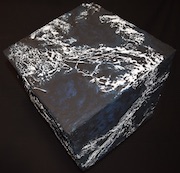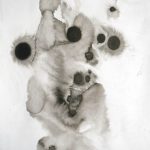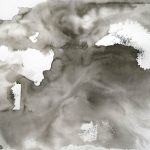Interview with David Bottile at Frequence
6 March 1995
1) Tell us about your work in Psychology.
I got my university degree in psychology, focusing on psychophysiology, studying sleep and consciousness. I went on to do research with Dr. Stephen LaBerge in lucid dreaming, and I helped design several electronic devices to monitor sleep and signal people when they are dreaming.
2) Is that how you got involved in music, or visa versa?
I have been playing electronic music since I was about 14 years old, long before my university studies. Both music and psychology interested me because I wanted to understand altered states of consciousness, among other things. In other words, I keep music and psychology separate, but they both stem from common interests.
3) The music of Trances/Drones makes people reflect. . . was this the objective? what did you want to express?
I wanted my early releases to resemble an auditory hallucinogen. I wanted the music to inspire reflection, trance, and “deep listening.” As my music progressed over the years, I have hoped to retain that element of trance while at the same time, to allow the music to be enjoyed at other levels.
4) Have you thought about suggesting your first work to the medical establishment? I’m thinking of “musicotherapy” but above all of psychiatry.
I tend to be very skeptical about claims for “healing music”. I think anything that is calm and deep, which the listener enjoys, can have the potential to help the listener heal somehow. However, I never wanted to be associated with those who make big claims about their music. Most “healing music” that I have heard is horribly boring. The most important thing for me is the artistic expression. I don’t want to limit my style with some pre-conception of what people need to relax. I do not want to tell people how to listen.
5) Are you interested in the effects of music (or sounds) on the mind? Were your San Francisco concerts real experiments?
I am very interested in the effects of music on the mind, but I rely on myself to measure its effects, I do not scientifically measure its effects on others. I am convinced that there is much to learn about the physiological and psychological effects of music, but I am more interested in the art than the science. In particular, I believe that most efforts to “measure” music do not consider the role of culture. Something that has an effect on you or me may not have the same effect on someone from New Guinea or Mongolia. Music is not universal.
When I compose, I pay attention to how I feel about each moment of sound. If the music makes me feel something strong, if it gives me chills or makes me cry, then I guess that it will work for people who listen to music in the same way that I do. That is all that I can honestly do.
Many of my early concerts were experiments, but I would not call them scientific. My Sleep Concerts were experiments in new ways to listen to very slow, quiet music. I did do a bit of “research” however. After performing all night to a sleeping audience, I asked people to stay if they wanted to, and share their experience. I listened to the group as they described what they heard, as they told their dreams. I answered questions and explained hypnogogic imagery and REM sleep. (Hypnogogic images are those abstract pictures or sounds that we sometimes experience as we fall asleep or awaken.) These group discussions gave me information about the success of the concerts, and allowed me to improve them.
6) What were the results?
With the sleep concerts, the results varied with each listener. Some people had very profound experiences: lucid dreams, “out of body” experiences, deep trance or a sense of relocation in space. As an example, one listener related a dream where he was walking down a beach with giant statues, like on Easter Island, which conveyed a strong force to him like a magical incantation. I believe he was responding to ocean sounds that I used behind deep drones during one period of the concert (a bit like the piece “Seascape” on Drones). If the sound of the concerts was successful, it felt like the walls of the room were gone, replaced by a shifting outdoor sonic environment, a sort of virtual dreamworld.
7) Traditional music is now part of your work. How did you come to use it?
I have always enjoyed the music of other cultures, especially African, North Indian, and Indonesian. It’s only natural that the more I listen to this music, the more it influences me. There are other reasons. One is that these cultures have an advanced technology of trance music, and I feel that we, as newcomers to trance music, should learn from these cultures about how music can convey certain kinds of energy. Another reason involves my interest in microtonality and just intonation. I wanted to learn how these other cultures use tuning differently from the West, and I found that their musical vocabularies were very well suited to the tunings I use.
8) Were you interested by the “religious” aspects of traditional music?
I am cautious about the word “religion” because I don’t have much interest in organized religion. However, I am interested in any music that conveys a deep energy, a sense of transcendence, truth, or whatever you choose to call it. There is an authenticity to much non- western traditional music that conveys this energy, but you can also find it in some western music, both classical and modern.
9) Your music seems to be more and more “spiritual”. Are you a believer?
What do you mean “believer”? Believer in God? Well, I believe what I experience, and I believe that it is possible to experience “God” directly, within the body, within the ‘self’. However, I don’t believe in an anthropomorphic god, or a multiplicity of gods. I sense a unifying principle, something that flows through all of us. It inspires my music and keeps me alive. Beyond that, I am unable to explain.
10) Do you travel to different countries to find inspiration?
I travel to perform, but I travel much farther inside myself. You won’t find anything far away that you can’t find within yourself. Certain other cultures do interest me very much, and I hope to learn more about them by traveling someday, but I don’t feel that I am limited by staying at home.
11) You also collaborate with other artists, like Steve Roach or Dirk Serries. . .
Collaboration is essential for a healthy creative life. I feel there is a community of musicians with common goals, and it is a joy to share my voice with them. I am working now with Brian Williams (Lustmord), and hope to do something soon with Stefano Musso (Alio Die). I also helped Forrest Fang and A Produce with their latest albums. My most recent release, Yearning, is a collaboration with sarod player Lisa Moskow. I feel that we should all support each others efforts, as it makes all of our music better. Every collaboration inspires me, and I hope it inspires the other people as well.
12) Do you still do concerts or performances?
Yes, of course! It is often a challenge to make this music work in a live setting, but I think it helps keep the music healthy. It is a wonderful feeling to share the energy of a live audience, and I think in some ways it is still best for music to be heard in a group setting. After all, music began as a form of communal ritual, and it would be a shame for our culture to lose that connection.
I just returned from several concerts in California, and last year I played a few concerts in Italy. I don’t perform often, but I will probably keep doing it.
13) What are your plans?
I am now half done with the album with Lustmord, to be called Stalker. It is wonderfully deep and strange. I am also starting two new projects. The first is a new Amoeba album (a band project – we released a 5-song CD in 1993 that I am not very happy with. This new one will be very different, quiet and introspective songs with vocals.) The other is a new solo album for Fathom/HOS. The solo album will probably be very rhythmic, taking the vocabulary of Propagation a step further. I am sure that other collaborations will happen soon as well. For the long term, I cannot say – I follow my spirit wherever it leads me. Most of all, I want to keep learning and growing, developing my skills, because there is always more to discover!






You must be logged in to post a comment.